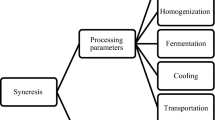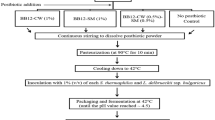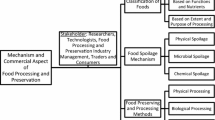Abstract
To date, the coffee industry has the second highest market value in the world and consumer behavior has transitioned from drinking coffee just for its caffeine content to reduce sleepiness into an overall experience. Instant cold brew coffee in powder form can preserve the taste of coffee well; moreover, it is easy to transport. Several consumers have increasing interests in implementing lactic acid bacteria in healthy food due to their growing awareness of the probiotic’s role. Several scholars have presented stress adaptation characteristics of single probiotic strains; however, comparisons of the stress-tolerant capacities of different probiotic strains are incomplete. Five lactic acid strains are tested for adaptation under four sublethal conditions. Lactobacillus casei is the most resilient probiotic in terms of heat and cold adaptation, while Lactobacillus acidophilus is more tolerant to low acid and bile salt; Then, these probiotics are subjected to a stress challenge that stimulates drying temperature, including a heat and cold stress challenge. The results show that acid adaptation can improve Lactobacillus acidophilus TISTR 1338 tolerance to harsh drying temperatures. In addition, encapsulation using prebiotic extracts from rice bran, with pectin and resistant starch combined through crosslinking and treated by freeze-drying, provides the highest encapsulation efficiency. In summary, acid-adapted L. acidophilus TISTR 1388 at the sublethal level can be applied to high and low temperature processing techniques. Additionally, the amount of viable probiotic after in vitro digestion remains at 5 log CFU/g, which is suitable for application in the production of synbiotic cold brew coffee.


Similar content being viewed by others
Data availability
The data that support the findings of this study are openly available in Springer Nature at http://doi.org/[doi], reference number [reference number].
References
Adu KT, Wilson R, Nichols DS, Baker AL, Bowman JP, Britz ML (2018) Proteomic analysis of Lactobacillus casei GCRL163 cell-free extracts reveals a SecB homolog and other biomarkers of prolonged heat stress. PLoS One 13(10):e0206317. https://doi.org/10.1371/journal.pone.0206317
Al-Sadi R, Nighot P, Nighot M, Haque M, Rawat M, Ma TY (2021) Lactobacillus acidophilus Induces a strain-specific and toll-like receptor 2–dependent enhancement of intestinal epithelial tight junction barrier and protection against intestinal inflammation. Am J Pathol 191:872–884. https://doi.org/10.1016/j.ajpath.2021.02.003
And CI, Kailasapathy K (2005) Effect of co-encapsulation of probiotics with prebiotics on increasing the viability of encapsulated bacteria under in vitro acidic and bile salt conditions and in yogurt. J Food Sci 70:M18–M23. https://doi.org/10.1111/j.1365-2621.2005.tb09041.x
Azcarate-Peril MA, Altermann E, Hoover-Fitzula RL, Cano RJ, Klaenhammer TR (2004) Identification and Inactivation of Genetic Loci Involved with Lactobacillus acidophilus Acid Tolerance. Appl Environ Microbiol 70:5315–5322. https://doi.org/10.1128/AEM.70.9.5315-5322.2004
Beaufils S, Sauvageot N, Mazé A, Laplace JM, Auffray Y, Deutscher J, Hartke A (2007) The cold shock response of Lactobacillus casei: relation between HPr phosphorylation and resistance to freeze/thaw cycles. J Mol Microbiol Biotechnol 13(1–3):65–75. https://doi.org/10.1159/000103598
Bicudo MOP, Jó J, de Oliveira GA, Chaimsohn FP, Sierakowski MR, de Freitas RA, Ribani RH (2015) Microencapsulation of Juçara (Euterpe edulis M.) pulp by spray drying using different carriers and drying temperatures. Drying Technol 33:153–161. https://doi.org/10.1080/07373937.2014.937872
Ceapa C, Wopereis H, Rezaïki L, Kleerebezem M, Knol J, Oozeer R (2013) Influence of fermented milk products, prebiotics and probiotics on microbiota composition and health. Best Pract Res Clin Gastroenterol Gut Microbiome 27:139–155. https://doi.org/10.1016/j.bpg.2013.04.004
Chen YY, Gänzle MG (2016) Influence of cyclopropane fatty acids on heat, high pressure, acid and oxidative resistance in Escherichia coli. Int J Food Microbiol 222:16–22. https://doi.org/10.1016/j.ijfoodmicro.2016.01.017
Chen M-J, Tang H-Y, Chiang M-L (2017) Effects of heat, cold, acid and bile salt adaptations on the stress tolerance and protein expression of kefir-isolated probiotic Lactobacillus kefiranofaciens M1. Food Microbiol 66:20–27. https://doi.org/10.1016/j.fm.2017.03.020
Chotiko A, Sathivel S (2016a) Three protective agents for pectin-rice bran capsules for encapsulating Lactobacillus plantarum. Food Biosci 16:56–65. https://doi.org/10.1016/j.fbio.2016.10.001
Chotiko A, Sathivel S (2016b) Development of a combined low-methoxyl-pectin and rice-bran-extract delivery system to improve the viability of Lactobacillus plantarum under acid and bile conditions. LWT Food Sci Technol 66:420–427. https://doi.org/10.1016/j.lwt.2015.10.058
Corsetti, A., Valmorri, S (2011) Lactic Acid bacteria|Lactobacillus spp.: Lactobacillus plantarum. In: Fuquay JW (ed) Encyclopedia of dairy sciences (Second Edition), pp 111–118. https://doi.org/10.1016/B978-0-12-374407-4.00263-6
Crittenden R, Laitila A, Forssell P, Mättö J, Saarela M, Mattila-Sandholm T, Myllärinen P (2001) Adhesion of Bifidobacteria to Granular Starch and Its Implications in Probiotic Technologies. Appl Environ Microbiol 67:3469–3475. https://doi.org/10.1128/AEM.67.8.3469-3475.2001
Cui H, Yuan L, Lin L (2017) Novel chitosan film embedded with liposome-encapsulated phage for biocontrol of Escherichia coli O157:H7 in beef. Carbohyd Polym 177:156–164. https://doi.org/10.1016/j.carbpol.2017.08.137
da Silva TM, de Deus C, de Souza Fonseca B, Lopes EJ, Cichoski AJ, Esmerino EA, de Bona da Silva C, Muller EI, Moraes Flores EM, de Menezes CR (2019) The effect of enzymatic crosslinking on the viability of probiotic bacteria (Lactobacillus acidophilus) encapsulated by complex coacervation. Food Res Int 125:108577. https://doi.org/10.1016/j.foodres.2019.108577
Desmond C, Fitzgerald GF, Stanton C, Ross RP (2004) Improved Stress Tolerance of GroESL-Overproducing Lactococcus lactis and Probiotic Lactobacillus paracasei NFBC 338. Appl Environ Microbiol 70:5929–5936. https://doi.org/10.1128/AEM.70.10.5929-5936.2004
Devarajan A, Mudgil P, Aldhaheri F, Hamed F, Dhital S, Maqsood S (2022) Camel milk-derived probiotic strains encapsulated in camel casein and gelatin complex microcapsules: stability against thermal challenge and simulated gastrointestinal digestion conditions. J Dairy Sci 105:1862–1877. https://doi.org/10.3168/jds.2021-20745
Food and Agriculture Organization [FAO] (2002) Probiotic guidelines. United Nation, FAO
Fenster K, Freeburg B, Hollard C, Wong C, Laursen RR, Ouwehand AC (2019) The production and delivery of probiotics: a review of a practical approach. Microorganisms 7(3):83. https://doi.org/10.3390/microorganisms7030083
Fiocco D, Longo A, Arena MP, Russo P, Spano G, Capozzi V (2020) How probiotics face food stress: they get by with a little help. Crit Rev Food Sci Nutr 60:1552–1580. https://doi.org/10.1080/10408398.2019.1580673
Girón-Hernández J, Gentile P, Benlloch-Tinoco M (2021) Impact of heterogeneously crosslinked calcium alginate networks on the encapsulation of β-carotene-loaded beads. Carbohydr Polym 271:118429. https://doi.org/10.1016/j.carbpol.2021.118429
Gobbetti M (1999) LACTOBACILLUS|Lactobacillus casei. In: Robinson RK (ed) Encyclopedia of food microbiology. Elsevier, Oxford, pp 1157–1164. https://doi.org/10.1006/rwfm.1999.0910
Goderska K, Czarnecki Z (2008) Influence of microencapsulation and spray drying on the viability of Lactobacillus and Bifidobacterium strains. Polish Journal of Microbiology 57(2), 135–40. https://pubmed.ncbi.nlm.nih.gov/18646401/
Gómez-Zavaglia A, Disalvo E, De Antoni G (2000) Fatty acid composition and freeze-thaw resistance in Lactobacilli. J Dairy Res 67:241–247. https://doi.org/10.1017/S0022029900004179
Guineo-Alvarado J, Quilaqueo M, Hermosilla J, González S, Medina C, Rolleri A, Lim L-T, Rubilar M (2021) Degree of crosslinking in β-cyclodextrin-based nanosponges and their effect on piperine encapsulation. Food Chem 340:128132. https://doi.org/10.1016/j.foodchem.2020.128132
Haddaji N, Krifi B, Lagha R, Khouadja S, Bakhrouf A (2015) Effect of high temperature on viability of Lactobacillus casei and analysis of secreted and GroEL proteins profiles. J Bacteriol Res 7(3):29–34. https://doi.org/10.5897/JBR2015.0155
Hemme D, Foucaud-Scheunemann C (2004) Leuconostoc, characteristics, use in dairy technology and prospects in functional foods. Int Dairy J 14:467–494. https://doi.org/10.1016/j.idairyj.2003.10.005
Horackova S, Veselá K, Klojdová I, Berčíková M, Plockova M (2020) Bile salt hydrolase activity, growth characteristics and surface properties in Lactobacillus acidophilus. Eur Food Res Technol. https://doi.org/10.1007/s00217-020-03518-8
Huang R, Pan M, Wan C, Shah NP, Tao X, Wei H (2016) Physiological and transcriptional responses and cross protection of Lactobacillus plantarum ZDY2013 under acid stress. J Dairy Sci 99:1002–1010. https://doi.org/10.3168/jds.2015-9993
Khosravi Zanjani MA, Ghiassi Tarzi B, Sharifan A, Mohammadi N (2014) Microencapsulation of probiotics by calcium alginate-gelatinized starch with chitosan coating and evaluation of survival in simulated human gastro-intestinal condition. Iran J Pharm Res 13:843–852
Koç M, Koç B, Yilmazer MS, Ertekin FK, Susyal G, Bağdatlıoğlu N (2011) Physicochemical characterization of whole egg powder microencapsulated by spray drying. Drying Technol 29:780–788. https://doi.org/10.1080/07373937.2010.538820
Lillo-Pérez S, Guerra-Valle M, Orellana-Palma P, Petzold G (2021) Probiotics in fruit and vegetable matrices: Opportunities for nondairy consumers. LWT Food Sci Technol 151:112106. https://doi.org/10.1016/j.lwt.2021.112106
Litopoulou-Tzanetaki E, Tzanetakis N (1999) FERMENTED MILKS|range of products. In: Robinson RK (ed) Encyclopedia of food microbiology. Elsevier, Oxford, pp 774–784. https://doi.org/10.1006/rwfm.1999.0635
Liu T, Song X, An Y, Wu X, Zhang W, Li J, Sun Y, Jin G, Liu X, Guo Z, Wang B, Lei P, Cao H (2021) Lactobacillus rhamnosus GG colonization in early life ameliorates inflammaging of offspring by activating SIRT1/AMPK/PGC-1α pathway. Oxid Med Cell Longev 2021:3328505. https://doi.org/10.1155/2021/3328505
Lorca GL, Font de Valdez G, Ljungh A (2002) Characterization of the protein-synthesis dependent adaptive acid tolerance response in Lactobacillus acidophilus. J Mol Microbiol Biotechnol 4:525–532
Ma Y, Xu J, Jiang S, Zeng M (2022) Effect of chitosan coating on the properties of nanoliposomes loaded with oyster protein hydrolysates: Stability during spray-drying and freeze-drying. Food Chem 385:132603. https://doi.org/10.1016/j.foodchem.2022.132603
Markets and Markets (2020) Probiotics Market Growth Analysis, Trends, and Forecasts to 2026 | MarketsandMarkets [WWW Document]. https://www.marketsandmarkets.com/Market-Reports/probiotic-market-advanced-technologies-and-global-market-69.html. Accessed 12 Apr 2021
Naik A, Raghavendra SN, Raghavarao KSMS (2012) Production of coconut protein powder from coconut wet processing waste and its characterization. Appl Biochem Biotechnol 167:1290–1302. https://doi.org/10.1007/s12010-012-9632-9
Nunes GL, de Etchepare MA, Cichoski AJ, Zepka LQ, Jacob Lopes E, Barin JS, de Flores ÉMM, da Silva C, de Menezes BCR (2018) Inulin, hi-maize, and trehalose as thermal protectants for increasing viability of Lactobacillus acidophilus encapsulated by spray drying. LWT Food Sci Technol 89:128–133. https://doi.org/10.1016/j.lwt.2017.10.032
Obradović N, Volić M, Nedović V, Rakin M, Bugarski B (2022) Microencapsulation of probiotic starter culture in protein–carbohydrate carriers using spray and freeze-drying processes: Implementation in whey-based beverages. J Food Eng 321:110948. https://doi.org/10.1016/j.jfoodeng.2022.110948
Özdemir EE, Görgüç A, Gençdağ E, Yılmaz FM (2022) Physicochemical, functional and emulsifying properties of plant protein powder from industrial sesame processing waste as affected by spray and freeze drying. LWT Food Sci Technol 154:112646. https://doi.org/10.1016/j.lwt.2021.112646
Rajasheker G, Anil Kumar S, Hima Kumari P, Kavi Kishor PB (2019) Bacterial cold shock proteins—the molecular chaperones for multiple stress tolerance. Adv Biotechnol Microbiol 12(3):555837. https://doi.org/10.19080/AIBM.2019.12.555837
Sabatini N (2010) Chapter 24—A comparison of the volatile compounds, in Spanish-style, Greek-style and Castelvetrano-style Green Olives of the Nocellara del Belice Cultivar: Alcohols, Aldehydes, Ketones, Esters and Acids. In: Preedy VR, Watson RR (eds) Olives and olive oil in health and disease prevention. Academic Press, San Diego, pp 219–231. https://doi.org/10.1016/B978-0-12-374420-3.00024-3
Sarabandi K, Jafari SM, Mohammadi M, Akbarbaglu Z, Pezeshki A, Khakbaz Heshmati M (2019) Production of reconstitutable nanoliposomes loaded with flaxseed protein hydrolysates: stability and characterization. Food Hydrocoll 96:442–450. https://doi.org/10.1016/j.foodhyd.2019.05.047
Sauvageot N, Beaufils S, Mazé A, Deutscher J, Hartke A (2006) Cloning and characterization of a gene encoding a cold-shock protein in Lactobacillus casei. Fed Eur Microbiol Soc Microbiol Lett 254(1):55–62. https://doi.org/10.1111/j.1574-6968.2005.00006.x
Seyedabadi MM, Rostami H, Jafari SM, Fathi M (2021) Development and characterization of chitosan-coated nanoliposomes for encapsulation of caffeine. Food Biosci 40:100857. https://doi.org/10.1016/j.fbio.2020.100857
Šušković J (2000) The effect of bile salts on survival and morphology of a potential probiotic strain Lactobacillus acidophilus M92. World J Microbiol Biotechnol 16:673–678. https://doi.org/10.1023/A:1008909505651
Tan LL, Mahotra M, Chan SY, Loo SCJ (2022) In situ alginate crosslinking during spray-drying of lactobacilli probiotics promotes gastrointestinal-targeted delivery. Carbohydr Polym 286:119279. https://doi.org/10.1016/j.carbpol.2022.119279
Tarahomjoo S, Katakura Y, Shioya S (2008) New strategy for enhancement of microbial viability in simulated gastric conditions based on display of starch-binding domain on cell surface. J Biosci Bioeng 105:503–507. https://doi.org/10.1263/jbb.105.503
Terpou A, Papadaki A, Lappa IK, Kachrimanidou V, Bosnea LA, Kopsahelis N (2019) Probiotics in food systems: significance and emerging strategies towards improved viability and delivery of enhanced beneficial value. Nutrients 11:1591. https://doi.org/10.3390/nu11071591
Tsakalidou E, Papadimitriou K (eds) (2011) Stress Responses of Lactic Acid Bacteria, 2011th, edition. Springer, New York
Upadrasta A, Stanton C, Hill C, Fitzgerald GF, Ross RP (2011) Improving the stress tolerance of probiotic cultures: recent trends and future directions. In: Stress responses of lactic acid bacteria, pp 395–438. https://doi.org/10.1007/978-0-387-92771-8_17
Wood JL, Osman A, Wade SA (2019) An efficient, cost-effective method for determining the growth rate of sulfate-reducing bacteria using spectrophotometry. MethodsX 6:2248–2257. https://doi.org/10.1016/j.mex.2019.09.036
Wu G, Hui X, Mu J, Gong X, Stipkovits L, Brennan MA, Brennan CS (2021) Functionalization of sodium caseinate fortified with blackcurrant concentrate via spray-drying and freeze-drying techniques: the nutritional properties of the fortified particles. LWT Food Sci Technol 142:111051. https://doi.org/10.1016/j.lwt.2021.111051
Xu W, Sun H, Li H, Li Z, Zheng S, Luo D, Ning Y, Wang Y, Shah BR (2022) Preparation and characterization of tea oil powder with high water solubility using Pickering emulsion template and vacuum freeze-drying. LWT Food Sci Technol. https://doi.org/10.1016/j.lwt.2022.113330
Yao M, Xie J, Du H, McClements DJ, Xiao H, Li L (2020) Progress in microencapsulation of probiotics: a review. Compr Rev Food Sci Food Saf 19:857–874. https://doi.org/10.1111/1541-4337.12532
Yoha KS, Moses JA, Anandharamakrishnan C (2020) Effect of encapsulation methods on the physicochemical properties and the stability of Lactobacillus plantarum (NCIM 2083) in synbiotic powders and in-vitro digestion conditions. J Food Eng 283:110033. https://doi.org/10.1016/j.jfoodeng.2020.110033
Zayed G, Roos Y (2004) Influence of trehalose and moisture content on survival of Lactobacillus salivarius subjected to freeze-drying and storage. Process Biochem 39:1081–1086. https://doi.org/10.1016/S0032-9592(03)00222-X
Zhang Y, Lin J, Zhong Q (2016) Effects of media, heat adaptation, and outlet temperature on the survival of Lactobacillus salivarius NRRL B-30514 after spray drying and subsequent storage. LWT Food Sci Technol 74:441–447. https://doi.org/10.1016/j.lwt.2016.08.008
Zhen N, Zeng X, Wang H, Yu J, Pan D, Wu Z, Guo Y (2020) Effects of heat shock treatment on the survival rate of Lactobacillus acidophilus after freeze-drying. Food Res Int Ott Ont 136:109507. https://doi.org/10.1016/j.foodres.2020.109507
Zielińska D, Kołożyn-Krajewska D (2018) Food-origin lactic acid bacteria may exhibit probiotic properties: review. Biomed Res Int. https://doi.org/10.1155/2018/5063185
Zou H, Zhao N, Li S, Sun S, Dong X, Yu C (2020) Physicochemical and emulsifying properties of mussel water-soluble proteins as affected by lecithin concentration. Int J Biol Macromol 163:180–189. https://doi.org/10.1016/j.ijbiomac.2020.06.225
Funding
This research is a part of the process development of functional symbiotic products from defatted organic rice bran for promoting the digestive system, and it is a continuous project of the effects of prebiotics from rice bran extract on the growth of heat-resistant probiotic bacteria and their applicability. The authors have disclosed receipt of the following financial support for the research, authorship, and/or publication of this article: Thailand Science Research and Innovation (TSRI) organization, Thailand [grant number CPR6405031700].
Author information
Authors and Affiliations
Contributions
All authors contributed equally to this work.
Corresponding author
Ethics declarations
Conflict of interest
All authors declare that they have no conflicts of interest. Furthermore, this research is not applicable for ethical approval, and there are no competing interests.
Additional information
Communicated by Yusuf Akhter.
Publisher's Note
Springer Nature remains neutral with regard to jurisdictional claims in published maps and institutional affiliations.
Rights and permissions
Springer Nature or its licensor (e.g. a society or other partner) holds exclusive rights to this article under a publishing agreement with the author(s) or other rightsholder(s); author self-archiving of the accepted manuscript version of this article is solely governed by the terms of such publishing agreement and applicable law.
About this article
Cite this article
Tianwitawat, C., Klaiprasitti, P. Rice bran as an encapsulating material to produce a healthy synbiotic product with improved gastrointestinal tolerance. Arch Microbiol 205, 265 (2023). https://doi.org/10.1007/s00203-023-03586-w
Received:
Revised:
Accepted:
Published:
DOI: https://doi.org/10.1007/s00203-023-03586-w




